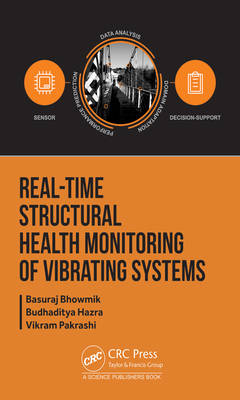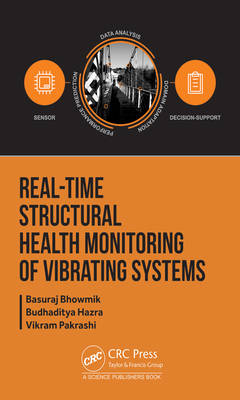
- Afhalen na 1 uur in een winkel met voorraad
- Gratis thuislevering in België vanaf € 30
- Ruim aanbod met 7 miljoen producten
- Afhalen na 1 uur in een winkel met voorraad
- Gratis thuislevering in België vanaf € 30
- Ruim aanbod met 7 miljoen producten
Real-Time Structural Health Monitoring of Vibrating Systems
Basuraj Bhowmik, Budhaditya Hazra, Vikram PakrashiOmschrijving
Targeted at researchers and practitioners in the field of science and engineering, the book provides an introduction to real time structural health monitoring. Most work to date is based on algorithms that require windowing of the accumulated data, this work presents a coherent transition from the traditional batch mode practice to a recently developed array of recursive approaches. The book mainly focuses on the theoretical development and engineering applications of algorithms that are based on first order perturbation (FOP) techniques. The development of real time algorithms aimed at identifying the structural systems and the inflicted damage, online, through theoretical approaches paves the way for an in-depth understanding of the discussed topics. It then continues to demonstrate the solution to a class of inverse dynamic problems through numerically simulated systems. Extensive theoretical derivations supported by mathematical formulations, pivoted around the simple concepts of eigenspace updates, forms the key cornerstone of the book. The output response streaming in real time from multi degree of freedom systems provide key information about the system's health that is subsequently utilized to identify the modal parameters and the damage, in real time. Damage indicators connotative of the nature, instant and location of damage, identified in a single framework are developed in the light of real time damage case studies. Backed by a comprehensive assortment of experimental test-beds, this book includes demonstrations to emulate real life damage scenarios under controlled laboratory conditions. Applicability of the proposed recursive methods towards practical problems demonstrate their robustness as viable candidates for real time structural health monitoring.
Specificaties
Betrokkenen
- Auteur(s):
- Uitgeverij:
Inhoud
- Aantal bladzijden:
- 234
- Taal:
- Engels
Eigenschappen
- Productcode (EAN):
- 9780367350956
- Verschijningsdatum:
- 22/09/2022
- Uitvoering:
- Hardcover
- Formaat:
- Genaaid
- Afmetingen:
- 156 mm x 234 mm
- Gewicht:
- 526 g

Alleen bij Standaard Boekhandel
Beoordelingen
We publiceren alleen reviews die voldoen aan de voorwaarden voor reviews. Bekijk onze voorwaarden voor reviews.











